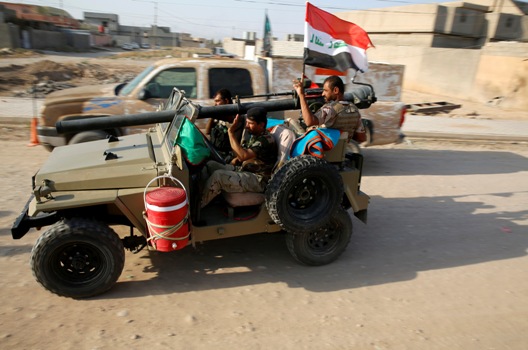Iraq to disarm pro-Iranian militias to avoid war with the US (and Israel)
Speaking to AsiaNews, Jordanian scholar Al Sabaileh says that reports that several Shia groups in Iraq plan to disarm are likely accurate. US pressure and the fear that Iraq might become another battleground like Syria, Lebanon and Yemen have been decisive. But with the end of the armed struggle, the militias’ political weight will not be the same in upcoming October elections.
Milan (AsiaNews) – There is a "good chance" that recent reports that several pro-Iranian militias and armed groups in Iraq intend to disarm are real since the country "is the last battleground left” untouched, this according to Amer Al Sabaileh, a Jordanian university professor and geopolitical expert on Middle Eastern issues, international security and peace process in crisis areas, and a contributor to several international newspapers, including The Jordan Times.
Iraq, he explains, represents "a very important battleground" where Iran can exert its influence, "the only one left, given that the Israelis have loosened their 'encirclement' over the past year and a half by striking in different places: from Gaza and the West Bank to Lebanon and Syria", with US assistance.
With Iraq as the last battleground, the United States is currently “at war with the Houthis in Yemen” to put pressure on Iran, ahead of talks tomorrow in Oman between high-level US and Iranian delegations to discuss Iran’s nuclear programme.
“No one can deny that the relationship between Iran and the mostly Shia Popular Mobilisation Forces in Iraq is very similar to that with other armed groups such as Hezbollah in Lebanon,” Al Sabaileh explained.
"They are an operational arm for Tehran and it is normal that Iran has thought in the past of using this battleground as part of talks or possible US and Israeli attack on its territory.”
To ease tensions and in response to the many warnings leaked by US officials to the Iraqi government since Donald Trump moved back into the White House, the prospect of disarming many of these militias seems increasingly plausible.
If this happens, it would be an historic step because it might signal an end to the armed struggle amid growing regional tensions in the Middle East that could also see Iraq dragged into war.
The US has warned Iraq that without a decisive action to block armed pro-Iranian militias, the response would be of a military nature with attacks and air raids in Iraq, sliding towards war with inevitable repercussions for civilians.
In this regard, Izzat al-Shahbndar, a high-level Shia politician close to the ruling alliance, told Reuters that talks between Prime Minister Mohammed Shia al-Sudani and several militia leaders are at an advanced stage.
Kataib Hezbollah, classified as a terror group by the US, is one of the groups inclined to accept US disarmament demands; others include Nujabaa, Kataib Sayyed al-Shuhada, and Ansarullah al-Awfiyaa.
The commanders of these militias say that their main ally and patron, the Revolutionary Guards (IRGC, the Pasdaran), has given its blessing to any decision deemed necessary to avoid a devastating conflict with the US and Israel.
The militias are part of the Islamic Resistance in Iraq, an umbrella group of about 10 Shia groups with some 50,000 members and arsenals that include long-range missiles and anti-aircraft weapons.
“Iran remains the most important player on the Iraqi political scene, for its support to the militias and the role it has played in the country since the fall of Saddam Hussein's regime,” notes Al Sabaileh, author of several studies on war and terrorism, in North Africa and the Middle East.
According to the Amman-born scholar, from being various allied groups, the militias have developed "a real military and operational role" in the country “with the war against Daesh (Islamic State). Tehran armed the Shia militias, which have become the pillar of the Iraqi army, while its men have been placed in all key positions within the Iraqi system.”
Iran exerts “very strong influence, which has been built over the years" and which has led Tehran to be the "number one player" so much so that it has been defined as "the true ruler of this country.”
However, Iran’s alliances and pro-Iranian armed militias "have suffered huge damage in the last year and a half in Lebanon, Syria and Yemen.” Even in Iraq, “Iran's weight will not be the same” in the upcoming national election in October; “its the role and political room to manoeuvre will no longer be the same.”
"When weapons are removed, it is hard to imagine that the political weight of these militias will remain unchanged.”
11/08/2017 20:05







.png)










